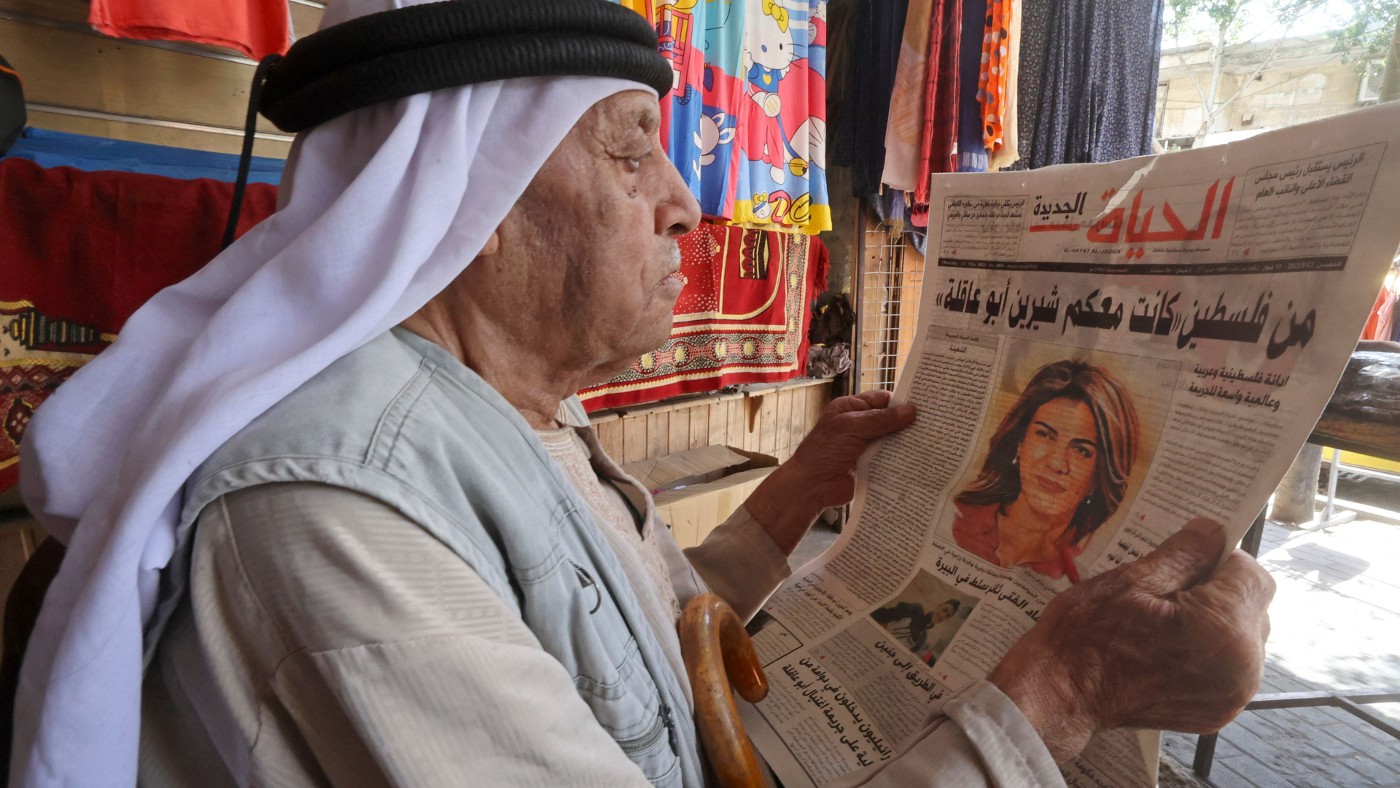The varying accounts of how Shireen Abu Akleh was killed
Eyewitnesses say Israeli soldiers ‘assassinated’ Al Jazeera journalist but PM claims Palestinians may be responsible

A free daily email with the biggest news stories of the day – and the best features from TheWeek.com
You are now subscribed
Your newsletter sign-up was successful
Rival narratives have emerged over how the Palestinian-American Al Jazeera journalist Shireen Abu Akleh was killed yesterday.
The veteran correspondent, described as an “icon of Palestinian coverage”, was shot while reporting in Jenin in the occupied West Bank. She was wearing a helmet and a protective jacket labelled “press”.
Al Jazeera insisted that Israeli troops “deliberately” shot their reporter in “cold blood”. A second Al Jazeera employee, Ali Samodi, a producer who was wounded in the incident, said that “all of a sudden” Israeli soldiers “opened fire at us” and “the first bullet hit me, the second one hit Shireen”.
The Week
Escape your echo chamber. Get the facts behind the news, plus analysis from multiple perspectives.

Sign up for The Week's Free Newsletters
From our morning news briefing to a weekly Good News Newsletter, get the best of The Week delivered directly to your inbox.
From our morning news briefing to a weekly Good News Newsletter, get the best of The Week delivered directly to your inbox.
Shatha Hanaysha, a journalist for Quds News Network who also witnessed the incident, said: “Even after [Abu Akleh] fell to the ground the fire did not stop and none of us were able to reach her.”
Hanaysha, who was less than a metre from Abu Akleh when she was shot, was in no doubt about what happened in front of her. “This is an assassination,” she said.
However, the Israeli prime minister Naftali Bennett said there was “a considerable chance” that “armed Palestinians, who fired wildly, were the ones who brought about the journalist’s unfortunate death”.
The Israeli military said its troops shot back after coming under “massive fire” in Jenin and announced initially that “there is a possibility, now being looked into, that reporters were hit – possibly by shots fired by Palestinian gunmen”.
A free daily email with the biggest news stories of the day – and the best features from TheWeek.com
However, said The Guardian, the Israeli military chief, Lt Gen Aviv Kochavi, “appeared to back away” from this claim, saying: “At this stage we cannot determine by whose fire she was harmed and we regret her death.”
According to the Agence France-Presse news agency, the Israel Defence Forces (IDF) denied they had deliberately targeted journalists and the Israeli government said it had “offered the Palestinians a joint pathological investigation”. The spokesman for the Palestinian Authority has already said his government rejects any role for Israel in any investigation.
Analysing two videos that are being shared online, Sky News said one shows the moment the reporter was shot, as those around her shout warnings that a sniper is firing at them, while the second shows what Israeli authorities claim is a Palestinian man in a balaclava “firing indiscriminately”.
The second video, which has been shared by Israel’s prime minister and the country’s foreign ministry, has one man’s words translated on screen: “They’ve hit one, they’ve hit a soldier, he’s laying on the ground.”
Writing on Twitter, Bennett said that as “no IDF soldier was injured”, this “increases the possibility that Palestinian terrorists were the ones who shot the journalist”.
Al Jazeera noted that the UN Human Rights Office has called for an “independent, transparent investigation into her killing” adding that “impunity must end”.
The White House also called for an investigation, saying it “must be immediate and thorough and those responsible must be held accountable”.
-
 What are the best investments for beginners?
What are the best investments for beginners?The Explainer Stocks and ETFs and bonds, oh my
-
 What to know before filing your own taxes for the first time
What to know before filing your own taxes for the first timethe explainer Tackle this financial milestone with confidence
-
 The biggest box office flops of the 21st century
The biggest box office flops of the 21st centuryin depth Unnecessary remakes and turgid, expensive CGI-fests highlight this list of these most notorious box-office losers
-
 Epstein files topple law CEO, roil UK government
Epstein files topple law CEO, roil UK governmentSpeed Read Peter Mandelson, Britain’s former ambassador to the US, is caught up in the scandal
-
 Iran and US prepare to meet after skirmishes
Iran and US prepare to meet after skirmishesSpeed Read The incident comes amid heightened tensions in the Middle East
-
 Israel retrieves final hostage’s body from Gaza
Israel retrieves final hostage’s body from GazaSpeed Read The 24-year-old police officer was killed during the initial Hamas attack
-
 China’s Xi targets top general in growing purge
China’s Xi targets top general in growing purgeSpeed Read Zhang Youxia is being investigated over ‘grave violations’ of the law
-
 Panama and Canada are negotiating over a crucial copper mine
Panama and Canada are negotiating over a crucial copper mineIn the Spotlight Panama is set to make a final decision on the mine this summer
-
 Why Greenland’s natural resources are nearly impossible to mine
Why Greenland’s natural resources are nearly impossible to mineThe Explainer The country’s natural landscape makes the task extremely difficult
-
 Iran cuts internet as protests escalate
Iran cuts internet as protests escalateSpeed Reada Government buildings across the country have been set on fire
-
 US nabs ‘shadow’ tanker claimed by Russia
US nabs ‘shadow’ tanker claimed by RussiaSpeed Read The ship was one of two vessels seized by the US military